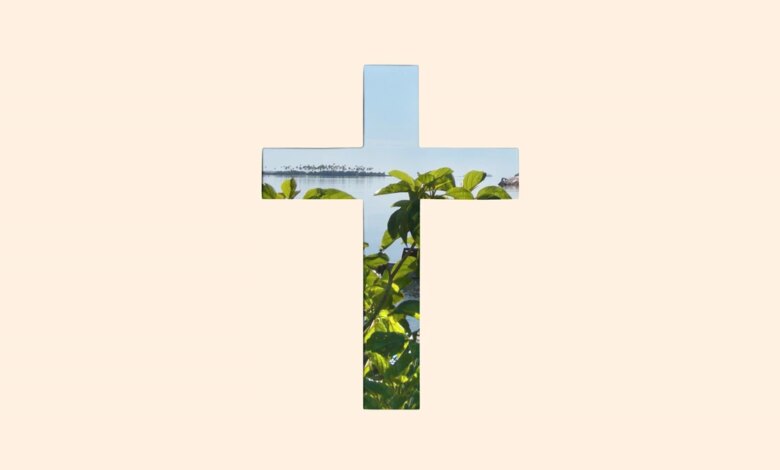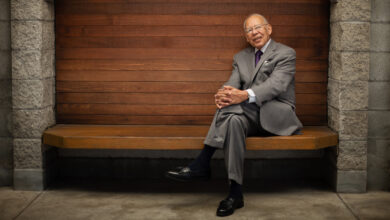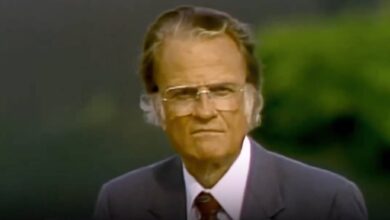Why the Pacific Islands Are 90 Percent Christian

Christian overseas missionaries were more successful in Oceania—the region spanning the Pacific Islands, Australia, Papua New Guinea, and New Zealand—than anywhere else in the world.
In particular, people in the Pacific Islands (which include Fiji, Papua New Guinea, Samoa, Vanuatu, Tonga, and more) were receptive to the gospel because “their ancestors’ strong beliefs in a divine presence and in the afterlife made them very open to Christian faith,” wrote Jacqueline Ryle, a contributor to the 2021 reference volume Christianity in Oceania.
Tongan Australian theologian Katalina Tahaafe-Williams says her research reveals the same: The growth of Christianity in the region was not because of white Europeans but rather due to Indigenous missionaries who translated Christianity in a way that made sense to locals.
Tahaafe-Williams, who lives in Sydney, served as the Indigenous coeditor for the book alongside prominent global Christianity scholars Kenneth R. Ross and Todd M. Johnson.
“Our goal was to recruit Indigenous writers from all over the region to contribute to this volume,” she explained. “It was my task to connect with potential authors, theologians, leaders, and church members from the Pacific Islands … we were very committed to finding, however challenging it might be, authors who were part of that particular culture, thereby making the work very authentic.”
CT Global books editor Geethanjali Tupps spoke with Tahaafe-Williams on why Christianity flourished in the Pacific Islands, how migration patterns have impacted the church, and why the region shouldn’t serve as the poster child for climate change issues.
How did Christianity arrive in the Pacific Islands?
Protestant missionaries arrived in the Pacific Islands in the 1700s and 1800s. They had huge success in evangelistic efforts because of the London Missionary Society, which established schools and trained pastors in Samoa and Cook Islands. In Tonga, Methodist missionaries were most successful; in Samoa, the Congregationalists and Presbyterians dominated.
Christianity’s initial success was in Tahiti, which is part of French Polynesia, though the locals still prefer the original name of Maohi Nui. There, the missionaries not only converted locals but equipped them to take the gospel to other islands. The local missionaries’ status as Indigenous Pacific Islanders contributed to their success.
Did colonization in the Pacific Islands differ from elsewhere in the world?
We are small island nations with minimal natural resources. We have beautiful settings, an abundance of fertile soil and food, and materials to build homes. But we don’t have precious minerals. So the Europeans had no economic interest in Oceania, except for Australia and New Zealand.
As a result, the Pacific Islands were colonized more for religious than political or economic reasons. I believe that fact explains why we are still 90 percent Christian today.
What did the Islanders believe in before Christians showed up, and how did Christianity and local cultures interact?
The Pacific Islands are classified into three main groups: Micronesia, Melanesia, and Polynesia. All these cultures, like other Indigenous communities, had their own traditional religions before Christianity arrived.
Indigenous beliefs were very much connected to nature, the land, the ocean, and the earth. For example, a notion of the divine as Mother Earth is very much part of that spirituality and Indigenous religions across the nations in the Pacific.
Of course, when Christianity came, there were clashes in many instances. For example, the faith’s focus on individual sin and salvation was, and still is, at odds with our culture’s collective existence. Ultimately, however, the success of Christianity in Oceania was unprecedented.
Talk about how the Islanders contextualized Christianity and made it their own.
Taking my home island of Tonga as an example, I see some remnants of our traditional religion in how we understand Christianity, because some of our myths and legends contained stories of self-sacrifice—giving up your life for your friends, family, and loved ones. These legends, in effect, were transferred to Jesus Christ. When the story of Jesus was told in those terms, it was easily understood and contextualized.
We still tell the traditional stories today, but strictly within cultural ceremonies. Our spiritual faith is completely rooted in the gospel. But I believe that some of the values I was brought up with, and that we now regard as normatively Christian, like human dignity, justice, compassion, hope, and peace, were also the values that my ancestors lived out in practice.
Did Christianity shake up the region’s social structures in any way?
In the Pacific Islands, there isn’t a huge demarcation between powerful nobles or chiefs and the common people because we have such a close kinship structure. It was much more difficult for the people at the top to abuse the people at the bottom, because they would be abusing people they were related to.
When Christian missionaries came, it didn’t dispel social division but exacerbated it, partly due to the competition between Methodists, Presbyterians, Roman Catholics, and other groups. If tribal tensions were present, the missionaries sometimes deliberately played on those underlying conflicts because it gave them leverage with certain groups.
I attribute the success of Christianity to our nobles and our people, who were deeply spiritual and respectful. They found ways to reconcile and unify their people, so that they could receive Western missionaries while preventing civil wars and unrest from developing because of religion.
What about women’s rights? Did Christians contribute to advancing them here?
I wouldn’t deny that Christianity has contributed toward advancing women’s rights in some ways, but to a large extent, organic change has come from our culture.
The missionaries came with their Western, Victorian, patriarchal values and influenced the locals with this mindset. But women enjoy a very high regard and position in our kinship structure, and this is seen in some of the cultural practices that we still continue to enact in our ceremonies. We had female monarchs and female chiefs.
The sacredness of womanhood in my Tongan culture seems to me to have been cheapened over the years because of our openness to Western influences. Those of us who are aware of that cultural history are having to critique and unlearn Western ideas. If we had been more fully able to integrate our cultural understandings and worldviews with the Western influences that came with Christianity, I think women would have been ordained earlier in many Pacific Island contexts.
In terms of present-day concerns, how are migration patterns into and out of the Pacific Islands impacting the church right now?
Migration to the Pacific Islands is transitional, where people come to do ministry or work on a development issue. They come only for a limited time and then go back to the West.
More Pacific Islanders are trying to get to Western countries. There are more Tongans living overseas than in Tonga. But some older expatriates are experiencing nostalgia for their homeland and have come back to retire, or at least return for significant periods of time to be with their family members.
The church in Tonga, where I am from, continues to thrive. When I visit, I love seeing how actively the younger generation is participating in the church. The older generation is proactive about ensuring that young people are engaged in faith and spirituality.
One of the most controversial events in Oceania, with ramifications that persist today, is when the United States, France, and the UK used Micronesia as target practice for nuclear testing after the end of WWII. This forcibly displaced residents in the Marshall Islands, Kiribati, and more, and when people moved back to their island homes, many fell sick with radiation exposure. Where was the church during this crisis?
Nuclear armament and proliferation was part of the political agenda for countries like France and the US. Many of us in other islands were not quite aware that these countries had claimed and possessed Micronesia for nuclear testing, until countries like New Zealand drew attention to it in the global arena.
Pacific Island nations started mobilizing themselves during this time. Churches were very much part of that effort because of the very close link between church and state in the region. Churches were very active in trying to find ways to fight against nuclear testing. They were standing up and fighting to make their voices heard in political debates and other arenas.
But Micronesia wasn’t the only region in Oceania that was impacted. Western countries were also conducting nuclear testing in Tahiti, one of the bigger island nations in French Polynesia. France was fully funding the Tahitian government and throwing money all over the place to try and hide the damage that they were doing and the terrible sickness and disfigurement of unborn babies.
Western countries are so powerful with their resources and military might. They got away with so much and still do to this day.
Do you find that Western privilege also permeates discussion on alleviating the effects of climate change in your region?
In recent times, the Oceania-Pacific region has become a lot more visible as the face of climate change in many global ecumenical and sociopolitical circles.
While working for the World Council of Churches in Geneva, I was very aware that Pacific Islanders were pushing for the visibility of climate change issues in churches and ecumenical circles, as well as in political settings such as the United Nations. However, it has become too easy to use a Pacific Islander as the face of climate change and its impacts, rather than saying this is a problem for all of us and we need to step up and confront it together.
To deal with the environmental problems associated with our carbon footprint, the Pacific Islands need resources that they don’t necessarily have. They should be getting resources to help manage the impacts of climate change, given that they are mostly the victims of it, not the cause.
When Western resources are accompanied with this sentiment—“We have the answers, and you have to just listen to us”—the locals are disabled from utilizing what they already know about living sustainably and from offering such knowledge to Westerners as resources.
Pacific Islanders, like all Indigenous communities around the globe, can still draw on their centuries-old knowledge of how to live with nature, the land, and the ocean in cohesive and harmonious ways. A patronizing and tokenistic emphasis on resources from the West has obscured the locals’ contextual knowledge and best practices for sustainable living, so that instead of enhancing such contextual gifts and skills to counter the impacts of climate change, a continuing colonial relationship of dependency is fostered.




